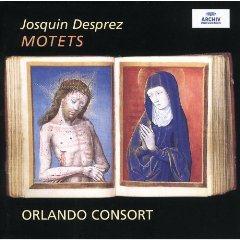Josquin Desprez - Motets (2000)
Josquin Desprez - Motets (2000)

01 - Inviolata, Integra, Et Casta Es Maria 02 - Ut Phoebi Radiis 03 - De Profundis Clamavi 04 - Christe Fili Dei - J'ay Pris Amours 05 - O Virgo Virginum 06 - Vultum Tuum Deprecabuntur - Vultum Tuum Deprecabuntur 07 - Vultum Tuum Deprecabuntur - Ave Maria, Gratia Plena 08 - Vultum Tuum Deprecabuntur - Sancta Dei Genitrix 09 - Vultum Tuum Deprecabuntur - O Intemerata Virgo 10 - Vultum Tuum Deprecabuntur - O Maria, Nullam Tam Gravem 11 - Vultum Tuum Deprecabuntur - Mente Tota Tibi Supplicamus 12 - Vultum Tuum Deprecabuntur - Ora Pro Nobis 13 - La Déploration De Johannes Ockeghem Nymphes Des Boys 14 - O Bone Et Dulcis Domine Jesus - Pater Noster - Ave Maria 15 - Huc Me Sydereo - Plangent Eum 16 - O Virgo Prudentissima - Beata Mater Orlando Consort
Josquin des Prez (d1521) was the supreme master of late medieval music. Only recently, however, have scholars been able to disentangle his biography from those of other minor figures with similar names (see Composer of the Month in the November 1998 issue of BBCMusic Magazine). In fact, not all of the pieces attributed to Josquin on these two discs are certainly by him. But this does not matter: both recordings, in contrasting ways, present a wealth of splendid music. The Obsidienne disc is extremely enjoyable but tends towards the ‘musical toyshop’ approach with tinkling instruments and percussion (in ‘Adieu mes amours’) and ‘folksong’ renderings of some of the chanson melodies. The ‘L’homme armé’ Mass is briskly but nicely done by a choir of 16 singers – but the confused bustle of voices in the Sanctus causes the music to dissolve from lack of direction (this perhaps accounts for the misprint ‘Josquib’ at the top of the contents list). By contrast the Orlando Consort, singing one-to-a-part, renders Josquin’s complex motets with precise tuning (very necessary in ‘Nymphes des boys’), a medieval French pronunciation of the Latin texts, and, above all, a terrific sense of the architecture of these pieces – especially in the massive ‘O virgo virginum’. Delicious. ---Anthony Pryer, classical-music.com
Recorded for Deutsche Grammophon in 1999 and not particularly well engineered, this album was reissued late in the 2000s decade by the Dutch budget label Brilliant. The original release dated from just before Britain's Orlando Consort, a male quartet here augmented with a couple of other singers, went on to wide popularity with a series of themed albums, both sacred and secular, that brought together varied strands of Renaissance music in highly listenable ways. Here the group plays it straight, plowing through 16 Josquin motets and hitting several of the greatest hits in the process. There's no real reason to sing these motets with one voice per part as is done here; Josquin was involved for most of life with choirs of boys and men, including the Sistine Chapel Choir, that clearly had more than one singer on each line. A group like the Tallis Scholars offers a better choice for a basic Josquin motet album. But the Orlando's high level of musicianship, combining both technical accuracy and expression, is everywhere in evidence here. Josquin's uncanny way of extracting distinctive polyphonic structures from the simplest of materials at the beginning of a piece is traced with perfect clarity, while the expressive dimension of a piece like De profundis clamavi (track 3), with the first-person "voice" gaining power as it climbs out of the depths all the while staying within the confines of a strict canon, is beautifully done. An alternative way of performing Josquin, but one that will be appreciated by those who favor a subjective approach to his motets.---James Manheim, AllMusic Review
download (mp3 @ kbs):
yandex 4shared mega mediafire uloz.to cloudmailru ge.tt








